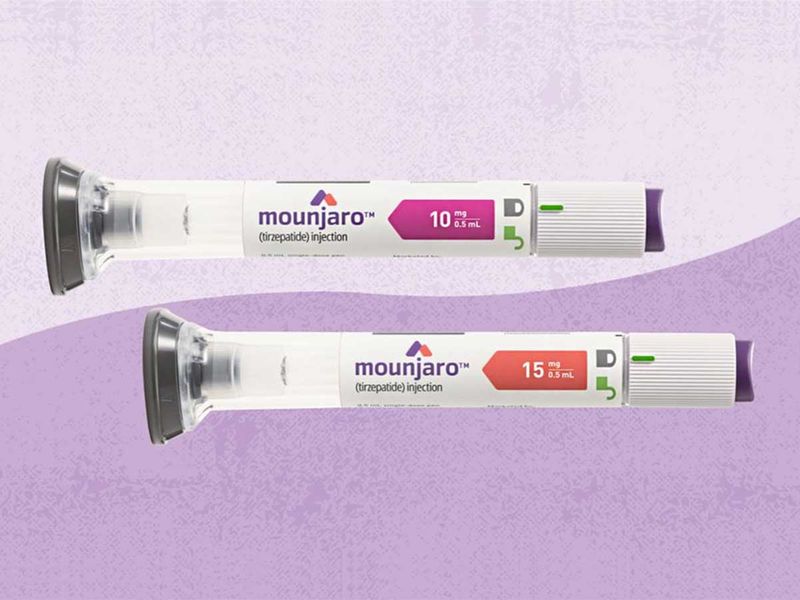
- A new study published on June 26, 2023 shows an experimental medicine known as "tri-agonist", or triple-G, may promote greater weight loss than any drug currently available.
- A phase 2 clinical trial that enrolled 338 obese or overweight adults using Eli Lilly's retatrutide investigational drug lost, on average, 24 per cent of their body weight, the equivalent of about 58 pounds (26.3 kg), at 48 weeks.
- Trial results were reported in late June at the American Diabetes Association’s annual meeting in San Diego the New England Journal of Medicine simultaneously published the findings.
Mind-blowing. A next-generation therapy. These are some of the superlatives used to describe results of a clinical trial of a new obesity injectible medicine were released.
The phase 2 test of the drug retatrutide (reta-tru-tide), the name for a new class of therapy called "triple G", or Tri-agonist (GIP-GLP1-Glucagon agonist) does show remarkable results — weight loss of up to 24.2 per cent after 48 weeks, outperforming outcomes from existing weight loss medications.
Retatrutide, an injectable made by US drug-maker Eli Lilly given once per week, is a member of the incretins medication class that mimics the effects of the GLP-1 hormone.
READ MORE
- Type 2 diabetes 'reversed' by intermittent fasting: First human trial shows
- Elon Musk tries intermittent fasting, claims to have lost 20 pounds
- How intermittent fasting affects body on molecular level
- When your body eats itself to survive: How you can benefit from autophagy
- ‘Diabesity’ study in India heralded by doctors
Compared to any of the currently-available medication, the trial showed more weight loss advantages could be obtained from it, than from existing drugs. In the fight against global obesity epidemic, it could be the next-generation weapon.
What we know so far:
What is the new drug and what does it do?
It is called retatrutide, a new therapy known as “tri-agonist” — which works at the hormone level, and is designed to help control blood sugar, slow stomach emptying, and reduce appetite.
The injectable is also known as a “triple agonist” or "Triple G” — GLP1/GIP/GCG receptor therapy.
Lilly, the drug maker which funded the second phase of the clinical trial (on humans), announced the phase 2 trial results on Monday (June 26, 2023). It was also published on the same day in the New England Journal of Medicine (NEJM).
What is a 'phase 2 trial', and how many people were involved in the retatrutide test?
The retatrutide phase 2 trial enrolled 338 adults, 51.8 per cent of whom were men. In a Phase 2 trial, researchers administer the drug to a group of patients with the disease or condition for which the drug is being developed. By design, the trial is randomised, “double-bind”, placebo-controlled.
What are the results?
The results were remarkable, and other obesity researchers dubbed it a“game-changer”. Researchers reported that 100 per cent of the participants that took the highest three doses achieved a “clinically significant” results.
At 48 weeks, the mean percentage change in the retatrutide groups was −8.7 per cent in the 1-mg group; −17.1 per cent in the combined 4-mg group; −22.8 per cent in the combined 8-mg group, and −24.2 per cent in the 12-mg group — as compared with − 2.1 per cent in the placebo group.
Moreover, a weight reduction at 48 week was 5 per cent or more, 10 per cent or more, and 15 per cent or more had occurred in 92 per cent, 75 per cent, and 60 per cent, respectively, of the participants who received 4 mg of retatrutide.
There was a 100 per cent, 91 per cent, and 75 per cent of those who received 8 mg; 100 per cent, 93 per cent, and 83 per cent of those who received 12 mg; and 27 per cent, 9 per cert — and 2 per cent of those who received placebo.
In earlier lab studies on mice, the “triple agonist” led to a lessened energy intake and higher energy expenditure — which led to lower body weight and lower blood glucose.
In earlier lab studies on mice, the “triple agonist” led to a lessened energy intake and higher energy expenditure — which led to lower body weight and lower blood glucose.
100 per cent of the participants that took the highest three doses achieved a “clinically significant” result.
What do other experts say?
Looking closely at the weight loss curves cited in the study, they haven’t even plateaued yet, so they expect these individuals to lose even more weight in a longer in larger phase 3 clinical trial.
Dr. Shauna Levy, an expert in obesity medicine who was not part of the study, called the latest findings "mind-blowing."
Levy, who was not engaged in the research, told CNBC that retatrutide appears to be producing outcomes that are comparable to those of bariatric surgery.
“It’s certainly knocking on the door or getting close,” said Dr Levy, of Tulane University, who is double board certified in General Surgery and Obesity medicine and is the current medical director of the Tulane Bariatric Center in New Orleans.
Why is it called a potential 'game-changer'?
“It’s kind of hard to believe… I’m still processing it. It’s that impressive,” Dr Michael Albert, an obesity doctor, co-founder and chief medical officer at Accomplish Health and Clinical Assistant Professor of Medicine at University of Oklahoma Health Sciences Center. “Absolute game-changer. Make me think,” he said in a TikTok post.
The market for weight-loss treatments, anticipated to exceed $100 billion by the end of the decade, has been revived by a new family of medications including tirzepatide.
Retatrutide may surpass tirzepatide, the weight-loss medication also from Lilly. That would depend on the results of a larger phase-3 trial.
Earlier this year, experts predicted that tirzepatide may surpass all other medications in sales. The FDA is anticipated to approve tirzepatide for use in weight loss this year or early in the following year.
Earlier this year, experts predicted that tirzepatide may surpass all other medications in sales. The FDA is anticipated to approve tirzepatide for use in weight loss this year or early in the following year. It is presently approved for Type 2 diabetes under the name Mounjaro.
Obesity is common in the United States and is a major health issue associated with numerous diseases, specifically an increased risk of certain types of cancer, coronary artery disease, type 2 diabetes, stroke, and cardiovascular disease, as well as significant increases in early mortality and economic costs.
1.9 b
number of people who are overweight (source: 2016 WHO Global Health Observatory data)Obesity is a major health issue associated with numerous diseases, specifically an increased risk of certain types of cancer, coronary artery disease, type 2 diabetes, stroke, and cardiovascular disease. It has significantly bumped up early mortality and economic costs.
Estimates of the medical cost of adult obesity in the United States range from $147 billion to nearly $210 billion per year, according to George Washington University.
According to the latest WHO Global Health Observatory data, collated in 2016, more than 1.9 billion adults were overweight, with 650 million of these individuals being obese.

Does that mean that, with this drug, people don’t need to sweat it out/exercise/reduce food intake in order to lose weight?
It’s not immediately clear from the study. The drug helps reduce appetite, which could potentially help normalise an obese person’s body-mass index level.
650 m
Number of obese individuals, based on WHO 2016 data.Already, weight-loss drugs like Ozempic and Mounjaro are flying off the shelves. It appears that in addition to aiding in weight loss, blood sugar regulation, and the reduction of fatty liver, retatrutide also triggers the biological process that burns calories when the liver turns glycogen into glucose and sends it into the bloodstream.
What is a tri-agonist drug? What are the key components?
They are compounds, also known as "triple agonists".
In general, “they couple the weight-reducing efficacy of glucagon-like peptide-1 receptor (GLP-1R), gastric inhibitory polypeptide receptor (GIP-R) and the glucagon receptor (GCGR) agonism while simultaneously buffering the glycemic effects of GCG with dual incretin receptor activation,” according to a US National Institutes of Health website.
1. GLP-1R stands for glucagon like peptide-1 receptor (GLP-1R) agonist, a member of the B family of G protein-coupled receptors found on beta cells of the pancreas and on neurons of the brain.
2. The GIP-R, also known as the glucose-dependent insulinotropic polypeptide receptor, is a protein that, in humans, is encoded by the GIP-R gene, which encodes a G-protein coupled receptor for gastric inhibitory polypeptide.
GIP-R was originally identified as an activity in gut extracts that inhibited gastric acid secretion and gastrin release, but subsequently was demonstrated to stimulate insulin release in the presence of elevated glucose. GIP-R is a member of the 7-transmembrane protein family, a class of G protein coupled receptors.
3. The glucagon receptor (GCGR) agonist, a peptide hormone secreted by pancreatic alpha cells, is a Class B GPCR that has an important role in maintenance of glucose homeostasis. It is encoded by the proglucagon gene; as such, is considered to be a valuable target for the treatment of diabetes.
What are the most common “adverse effects” of retatrutide?
Researchers said the most common adverse events in the retatrutide groups were gastrointestinal — these events were “dose-related, were mostly mild to moderate in severity, and were partially mitigated with a lower starting dose” (2 mg vs. 4 mg).
Retatrutide reportedly had a similar "tolerability profile" to tirzepatide, according to endocrinologist Dr Scott Isaacs, an obesity medicine specialist and faculty at Emory Medical School in Georgia, US.
Dose-dependent increases in heart rate peaked at 24 weeks and declined thereafter, the researchers noted, adding the side effect reporting seemed very similar to other GLP1 therapies with G.I. concerns being the top concern. Participants also saw improvement in triglyceride LDL and A1c.
It’s one of the commonly used tests to diagnose prediabetes and diabetes, and is also the main test to help you and your health care team manage your diabetes.
In addition to potentially having a hugely good impact on population health, this may literally save the US hundreds of billions of dollars in future healthcare expenses and assist in fixing the world’s aging population.
How much would it cost?
Its cost is currently unknown.
The bigger question: Will it be affordable? Will it be available, when and where? Its maker Lilly could only make the pricing announcement following the completion of a phase 3 trial that confirms the efficacy results of the previous studies, as well as its safety profile.
Once they are widely available, the US Government is expected to become the biggest buyer and insurer of these medications — and it may then set prices and guidelines for use.Lilly announced that they would expand phase 3 trials of retatrutide to check whether it may treat knee arthritis and sleep apnea as well.
When is the phase 3 trial expected to be completed?
Drug trials take time. The phase 3 clinical trial is expected to last until late 2025.










